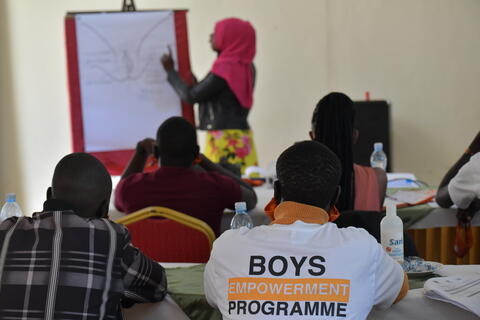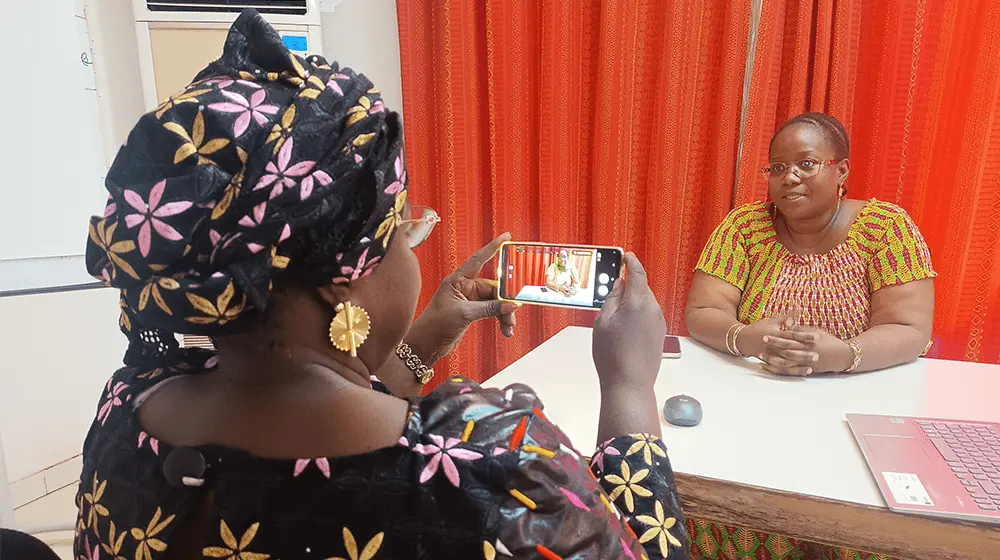News
Explainer: Why are gender equality and reproductive rights essential for peace?
- 20 September 2024
News
UNITED NATIONS, New York – The year 2023 was the most violent in decades, with the number of state-based conflicts rising to their highest level since the start of the Cold War.
When crises strike, the face of their consequences is disproportionately female. Although combatants are typically male, more than two thirds of civilians killed in conflict were women and children. Women and girls also constitute the vast majority of survivors of conflict-related sexual violence.
“The fate of humanity does not belong in the hands of men wielding bombs," said Dr. Natalia Kanem, Executive Director of UNFPA, the United Nations sexual and reproductive health agency. "It rests with women, young people and allies standing together waging peace."
Too often, though, peacebuilding processes have been presided over by male-dominated fighting forces and majority-male policymakers. So what role do women and young people play in promoting peace? And how does UNFPA empower them to participate?
What is peacebuilding?
Peacebuilding encompasses the spectrum of measures needed to reduce “the risk of lapsing or relapsing into conflict by strengthening national capacities for conflict management and [laying] the foundations for sustainable peace”.
That means peacebuilding requires much more than negotiating an end to wars, but also broader measures to prevent, mitigate and end disputes before they escalate into violence – including efforts to address power imbalances and inequality across society.
What does gender equality have to do with peace?

Equality, including gender equality, is a precondition for lasting peace. Research indicates, for example, that women’s suffrage has historically reduced the odds of interstate conflict.
Gender inequality, on the other hand, can fuel cycles of violence. Gender norms that dictate how men should behave – for example, those linking masculinity with aggression – can be weaponized to recruit men into conflict.
Around the world, UNFPA aims to shift these norms so that instead of perpetuating conflict, they propel peace. In Kenya, this takes the form of the Nitasimama Imara programme, which focuses on encouraging men and boys to advocate for gender equality.
“Cultivating champions against gender-based violence will help promote peace within our communities, which ultimately benefits the entire society,” said Ruth Wachera, deputy county commissioner of Kenya’s Kapenguria Division.
Why must women and young people be included in peacebuilding processes?
Research indicates that the inclusion of women in peacebuilding increases the likelihood that agreements will be reached and will stick. Young peacebuilders have also been shown to help suppress levels of violence and facilitate peaceful relations, and their involvement can generate wider support for measures towards reconciliation, which are essential to ensuring sustainable peace.
In Somalia, UNFPA supports programming to build youth capacity for their involvement in the country’s peacebuilding process. Two young men, Jamal* and Ismail*, said participating in the initiative had caused a change of heart.
“We used to be low-level gangsters, available for hire or even as volunteers to take part in clan fights,” Ismail said.
“Some of us are now reformed,” Jamal said. We are now actively participating in maintaining peace in the town.”
How do sexual and reproductive health and rights relate to peace?
The fulfilment of sexual and reproductive rights creates conditions favourable to peace, and vice versa. “When women have a voice and a choice, when women are economically empowered and when they participate in security and justice systems, conflict recovery accelerates and rates of abuse and misconduct fall,” Dr. Kanem said.
Women’s participation in peacebuilding also hinges on the degree to which they can move through society, free from the threat of violence – a core tenet of sexual and reproductive health and rights.
Conflict, on the other hand, destroys health systems, undermines the ability for women to give birth safely, interrupts access to essential supplies such as contraceptives, and escalates risks of gender-based violence. “Again and again, women and girls are forced to confront the worst of wars they did not start,” Dr. Kanem said.

How does UNFPA’s work promote peace?
UNFPA has established safe spaces in conflict and post-conflict settings around the globe that provide survivors of gender-based violence access to medical services, psychological support and legal counsel.
UNFPA’s programming also focuses on empowering women and young people and ensuring their inclusion in peacebuilding. In Burkina Faso, one such initiative offered leaders of women’s organizations instruction on mobile journalism and fact-checking, with the wider view of inspiring them to create balanced, measured content on their contribution to peacebuilding and the country's political transition process.
And in the Philippines, UNFPA supported the training of female ex-combatants in the conflict-affected Bangsamoro Autonomous Region in Muslim Mindanao to become parasocial workers. “I did not expect to have this kind of opportunity,” said Saima, who now serves as a community advocate against gender-based violence, with a strong focus on child marriage. “From my previous experience of holding guns, now I am holding a pen and a microphone.”
* Names have been changed for privacy and protection